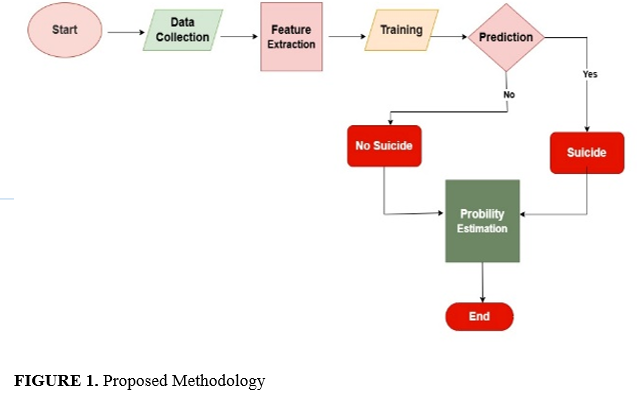Machine Learning-Based Suicide Risk Assessment and Intervention Strategies for Depression
Abstract
 Abstract Views: 0
Abstract Views: 0
Suicide is a global issue, primarily caused by depression. Over the past three decades, the World Health Organization reports that a considerable number of people have died by suicide. This study uses machine-learning models like Naive Bayes and logistic regression, to predict suicide risk using a dataset of social media posts. Previous research has used SVM and random forest, but deep learning techniques could improve accuracy by analyzing visual and auditory data. This would simplify mental health professionals' work and move away from traditional methods. In today’s digital world, leveraging digital tools can make significant progress in suicide prevention and mental health support. Moreover, future developments may include refined clinical reports with human experts, providing researchers with more effective tools for improving mental health outcomes
Downloads
References
World Health Organization. “Depression.” https://www.who.int/newsroom/fact-sheets/detail/depression (accessed Feb. 18, 2024).
J. T. O. Cavanagh, A. J. Carson, M. Sharpe, and S. M. Lawrie, “Psychological autopsy studies of suicide: A systematic review,” Psychol. Med., vol. 33, no. 3, pp. 395–405, Apr. 2023, doi: https://doi.org/10.1017/S0033291702006943.
J. J. Mann et al. Suicide prevention strategies: A systematic review. JAMA, vol. 294, no. 16, pp. 2064–2074, 2005, doi: https://doi.org/10.1001/jama.294.16.2064.
A. T. Beck, G. K. Brown, R. A. Steer, K. K. Dahlsgaard, and J. R. Grisham. Suicide ideation at its worst point: A predictor of eventual suicide in psychiatric outpatients. Suicide Life-Threat. Beh., vol. 29, no. 1, pp. 1–9, 2010, doi: https://doi.org/10.1111/j.1943-278X.1999.tb00758.x.
J. Van Os and S. Kapur. Machine learning in psychiatry: A primer. World Psychi., vol. 18, no. 2, pp. 87–96, 2019, doi: https://doi.org/10.1002/wps.20446.
M. Deisenroth, A. R. Kosiorek, and P. Singer. Can machines learn compassion? arXiv preprint, 2019.
J. Torous and L. E. Roberts. Digital Mental Health: Transforming the Prevention and Treatment of Mental Illness. Oxford University Press, 2019.
P. Fusar-Poli, P. D. McGorry, and J. M. Kane, “Improving outcomes of first-episode psychosis: an overview,” World Psy., vol. 2017, no. 16, pp. 251–265.
D. D. Luxton and V. Powers, “Artificial intelligence and mental health: Ethical considerations,” Am. J. Bioeth., vol. 19, no. 8, pp. 22–33, 2019, doi: https://doi.org/10.1089/1089089019825499.
M. Squires et al., “Deep learning and machine learning in psychiatry: A survey of current progress in depression detection, diagnosis and treatment,” Brain Inform., vol. 10, no. 1, Art. no. 10, Apr. 2023, doi: https://doi.org/10.1186/s40708-023-00188-6.
A. Roy, K. Nikolitch, R. McGinn, S. Jinah, W. Klement, and Z. A. Kaminsky, “A machine learning approach predicts the future risk of suicidal ideation from social media data,” NPJ Digital Med., vol. 3, no.1, pp. 1–12, 2020.
Z. Wen, S. Wang, D. M. Yang, Y. Xie, M. Chen, J. A. Bishop, and G. Xiao, “Deep learning in digital pathology for personalized treatment plans of cancer patients,” Seminar Diagn. Pathol., vol. 40, no. 2, pp. 109–119, Mar. 2023, doi: https://doi.org/10.1053/j.semdp.2023.02.003.
K. L. Celedonia, M. C. Compagnucci, T. Minssen, and M. L. Wilson, “Legal, ethical, and wider implications of suicide risk detection systems in social media platformsm,” J. Law Biosci., vol. 8, no.1, Art. no. lsab021, 2021, doi: https://doi.org/10.1093/jlb/lsab021.
L. Gega et al., “Digital interventions in mental health: evidence syntheses and economic modeling,” Health Technol. Assess., vol. 26, no. 1, pp. 1–82, 2022, doi: https://doi.org/10.3310/RCTI6942.
D. D. Luxton and V. Powers, “Artificial intelligence and mental health: Ethical considerations,” Am. J. Bioet., vol. 19, no. 8, pp. 22–33, 2019.

Copyright (c) 2024 Muhammad Yousif, Arfan Ali Nagra, Muhammad Abubakar, Shoaib Saleem, Farman Ali, Hamza Wazir Khan

This work is licensed under a Creative Commons Attribution 4.0 International License.
UMT-AIR follow an open-access publishing policy and full text of all published articles is available free, immediately upon publication of an issue. The journal’s contents are published and distributed under the terms of the Creative Commons Attribution 4.0 International (CC-BY 4.0) license. Thus, the work submitted to the journal implies that it is original, unpublished work of the authors (neither published previously nor accepted/under consideration for publication elsewhere). On acceptance of a manuscript for publication, a corresponding author on the behalf of all co-authors of the manuscript will sign and submit a completed the Copyright and Author Consent Form.






